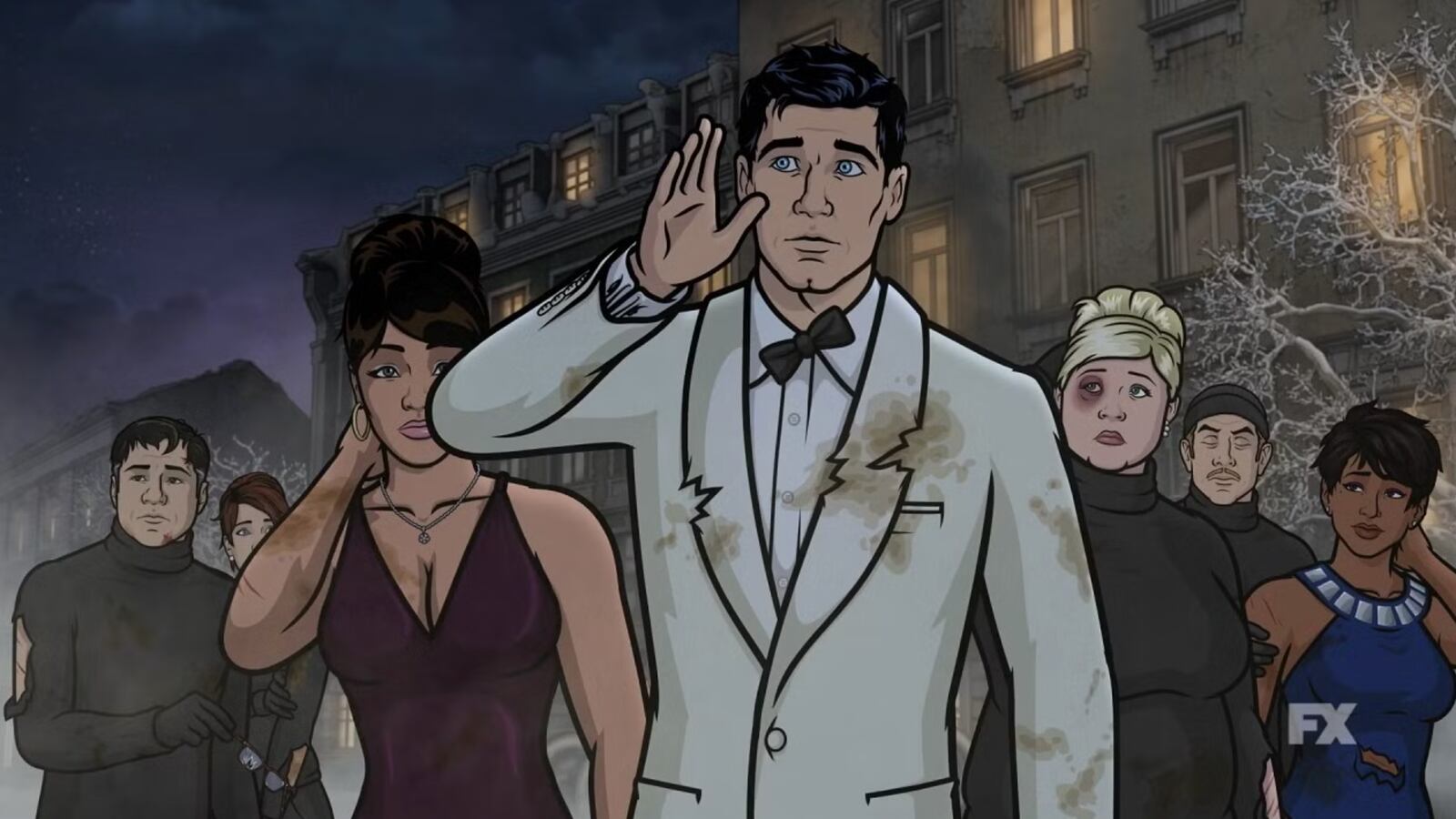Blessed with the peerless cynicism of a former intelligence agent, John le Carré’s 1963 novel The Spy Who Came in from the Cold remains the consensus pick for the high-water mark of the espionage genre. The author did away with the image of the spy as crusading defender of Western democracy, casting him instead as an impotent errand boy doing the bidding of shadowy authorities with no moral high ground over their enemies. As le Carré concluded, all these missions and casualties accomplish little more than reinforcing our existing architectures of influence.
It’s with a reverent wink that the super-sized Archer finale, subtitled Into the Cold (which premiered on FX Sunday night, Dec. 17), reflects this same notion. For 14 seasons, the stupid ineffectiveness of Sterling Archer’s much-rebranded agency has provided this FX animated spy spoof with punchlines, each operation tied up either in failure that doesn’t matter or hollow, meaningless successes. But as the gang prepares to disband and the Archer staff does the same, the bleak pointlessness of spycraft provides a clever channel for some weighty emotions rising to the surface.
This unusually tenacious show can be divided up into three phases: the unassailable run of early seasons, the hit-or-miss middle period that saw the ensemble dropped into various long-form homages generated by Archer’s comatose brain, and the resurgent late era returning everyone to reality. The four seasons collected in the final phase have delivered a lot of satisfying payoffs in terms of its protagonist’s development, as he’s dealt with the loss of his mother (forced by the passing of Jessica Walter, her absence as glaring and significant as Nancy Marchand’s in the role of comparably toxic matriarch Livia Soprano) and the move of his rival/lover Lana (Aisha Tyler) into Malory Archer’s vacated director chair. The psychology of an alcoholic, sex-addicted, terminally narcissistic mama’s boy has carried a run far longer than fans of creator Adam Reed’s short-lived previous series Frisky Dingo ever dared to expect. And in its parting hour, Archer’s quest for self-actualization dovetails with an existential crisis for his entire profession.
Due to the frequent, costly, and embarrassing fuckups of private agencies, the U.N. of Archer has readied a vote to outlaw para-governmental spying as a whole, sending everybody into a tidily metaphorical scramble to figure out what comes next. This is where Reed leaves room for most of the comedy in an episode with lots of dramatic ground to cover, as characters that the viewership has come to love all cope with an impending end in their own way.
Pam (Amber Nash) opts for denial, unable to accept losing the surrogate family she’s always liked more than they like her. Cyril (Chris Parnell) swallows some last helpings of abuse as everyone scoffs at the marketability of his accounting skills. Cheryl (Judy Greer) isn’t particularly worried, both because she has more money than she knows what to do with and because she has a very loose concept of what’s happening at any given moment. And relative newcomer Zara (Natalie Dew) takes a back seat— a smart move for the character that’s built up the least sentimental attachment—but only after some decent schtick about her sweaty search for a next gig.
Everyone gets the chance for One Last Ride with an assignment to foil a dam bombing in Russia meant to trigger a new Cold War, though Archer (H. Jon Benjamin) is torn. After all, torpedoing the job would send the world into a chaotic red alert, the only conditions under which he knows how to thrive. Stopping the bad guys—familiar faces Slater (Christian Slater) and Archer’s erstwhile cyborg paramour Katya (Ona Grauer)—and allowing the UN Resolution to pass poses a threat of extinction to his high-overhead lifestyle. Ultimately, we arrive at a recurring question, one that the show has answered in the negative as often as it’s dangled hope for the affirmative: Can Archer act in the interest of anyone other than himself? That quandary melts into a wider meditation on the temptation of doing the same thing forever versus the intimidating possibility of setting out on a fresh enterprise, surely something on the minds of a writers’ room in their 15th year together.
Plenty of shows have used the dissolution of their main narrative unit as a means of sorting through their own anxieties about concluding—the business closes, the kids move out, the show-within-the-show gets canceled. In Archer’s case, this device holds extra gravity in its application to an industry all about the absolute necessity of walking away. In the most overt baring of subtext, Cyril urges the leader of a squalor-village using the dam’s energy for cryptocurrency mining to vacate the area before it’s flooded. “There’s something better out there,” he says. “You’ve got to believe that. You’ve done incredible work here, maybe the most important work of your lives. But maybe, just maybe, it isn’t. And how great would it be if it isn’t and the best is still out there?”
But the episode diverges from Cyril’s upbeat tone in its final minutes, which instead find a form of hope in resignation. John le Carré became jaded after seeing the Sisyphean futility of espionage up close, but in the TV biz, there’s an odd comfort to be taken in the guarantee that nothing lasts. A show ends, and so what? You go make another one, or you do something else. In either case, time marches onward. Archer reasons that if they make his job illegal, that’s fine, he’ll just be an illegal spy. (It’s not as if he had an especially strong regard for the law up to this point anyhow.) As we can see in the sucker-punch final shot of him taking an elevator into the future with Pam—the one person this incorrigible ass has ever treated as an equal—if you’re really lucky, you meet some people worth holding onto along the way. And if you get the opportunity, you bring them with you. Work is unpredictable and unfair and uncertain, but sometimes, you get to spend a good while doing things you like with people you like. Life doesn’t get a whole lot better than that.







